Fighting Final Fantasy XIII - Episode 3: I Guess Square-Enix Forgot How To Write A Good Final Fantasy Story
By ZombiePie 21 Comments
AUTHOR'S NOTE: Here are links to the previous episodes of this series. Sorry for the delay on this episode.
- Fighting Final Fantasy XIII - Episode 1: This Game Has The Worst Introduction In Video Game History!
- Fighting Final Fantasy XIII - Episode 2: Yo Square, How Do You Make A JRPG Without ANY Good Characters?
Part 21: I Hate Snow
Chapters seven through ten represent the lowest point of Final Fantasy XIII. Top to bottom, these chapters are dreadful. The gameplay is frustratingly static, and the story becomes inscrutable. That is to say, Final Fantasy XIII turns into a slog. I suspect this might be the reason why some are overly forgiving about Gran Pulse. ANYTHING is better than slopping through the long corridors of the Palamecia.
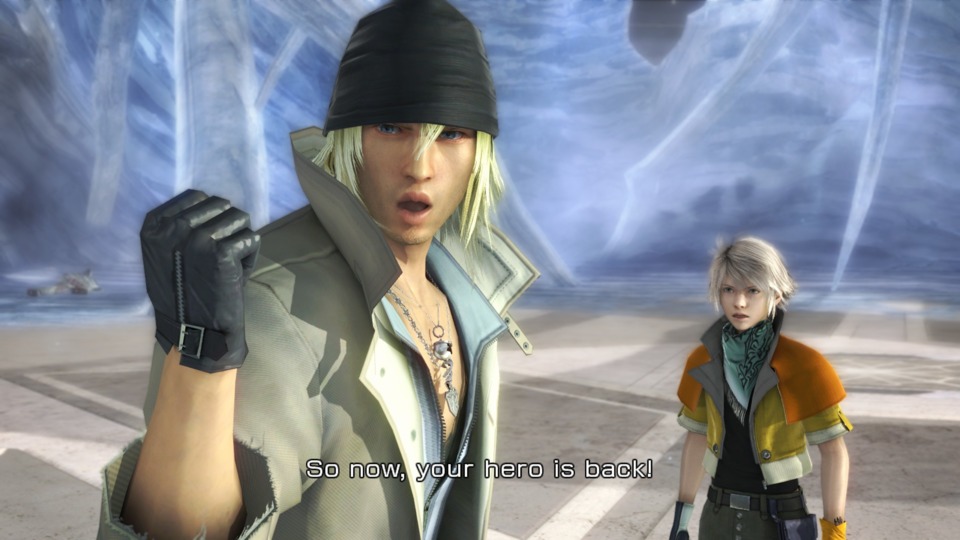
Before chapter six starts, there's a cinematic featuring Snow and Serah. You may recall I once defended Snow, and I stand by that defense. Snow's grandstanding makes sense in the first chapter. He's an emotionally driven character wanting to fulfill a relationship. The problem is he doesn't evolve. Snow continues to treat his companions disrespectfully. Worse, his dialogue consists of one-liners or loud sighs into Serah's crystal. By chapter seven I despised Snow.
Snow's chapter six cutscene is a drag. The cinematic starts with Snow and Serah running away from soldiers. We presume PSICOM found out about Serah, but how is left unanswered. There's an opportunity to include Lightning, but that never happens. Like many of the cutscenes before it, this cinematic exists in a bubble. Finally, the game's use of motion blur is nauseating. When the game adds shaky-cam to contextless cinematics, the results are headache-inducing.
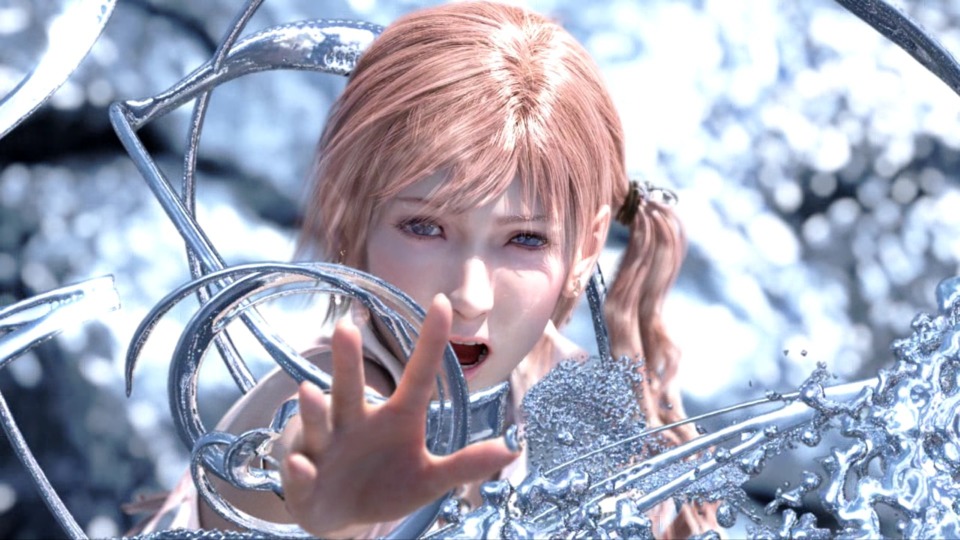
Snow and Serah board a flying motorcycle and try to make a hasty retreat. Both are shot and Snow ends up flying near a Sanctum fal'Cie. The fal'Cie grabs ahold of Serah and Snow falls onto a sandy beach. Why did Snow drive his getaway vehicle next to the fal'Cie? Which fal'Cie kidnapped Serah? How does Snow avoid getting arrested? Where is Lightning? The game does not answer these questions. In fact, just as the scene gets interesting, it juxtaposes to Sazh and Vanille.
You have to read codex entries to comprehend the cutscenes you've watched. There are no quiet transitional scenes where the characters process a change in scenery. Once a cinematic is over the game transitions to a corridor level. The characters never talk, and therein lies my problem with chapter six. We watch this flashback and the scene jump cuts to Sazh and Vanille. We don't juxtapose to Snow and learn about his state of mind. The game provides this flashy looking bullshit and moves onto something different.
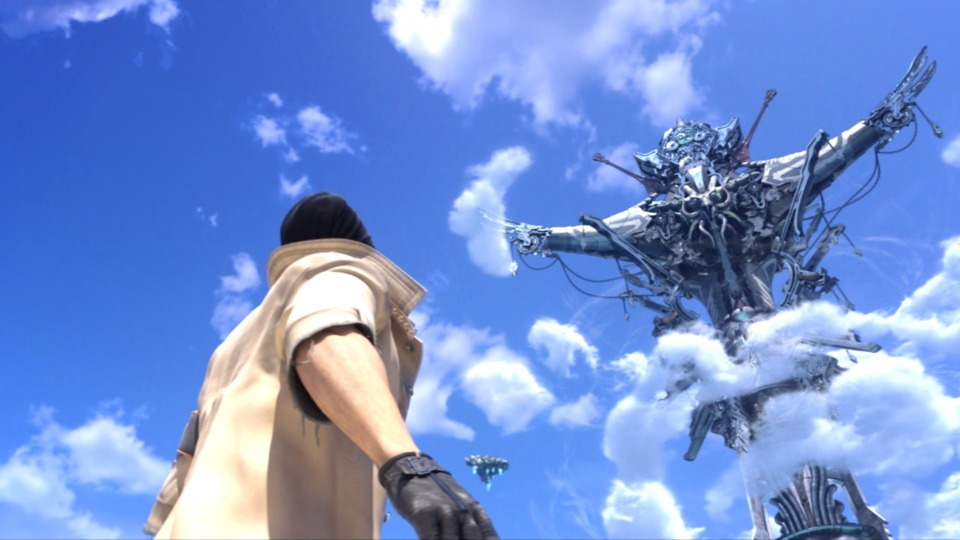
Part 22: Sazh And Vanille Are Fine. They're FINE!
Don't get me wrong, I don't "hate" Sazh and Vanille's moment in the Sunleth Waterscape. It's a beautiful level with a diverse degree of flora and fauna. The Sunleth Waterscape does a fantastic job of foreshadowing Sazh and Vanille's character arcs. Outside of Nautilus Park, it's one of the few compelling levels in Final Fantasy XIII. Regardless, the next level should have involved Snow. We haven't controlled Snow in HOURS, and the questions raised from the cutscene were worth addressing!
Nevertheless, Vanille and Sazh improve in the two chapters they are together. Vanille's tragic underpinning ensures she isn't stuck on cloud cuckoo land. I would even go so far as to suggest Vanille is one of the few characters with depth. This chapter is also when I fell in love with Sazh. I had my reservations Sazh was another person of color stuck playing the role of "comic relief." Luckily, Square knew better and his evolution is thoroughly fascinating.
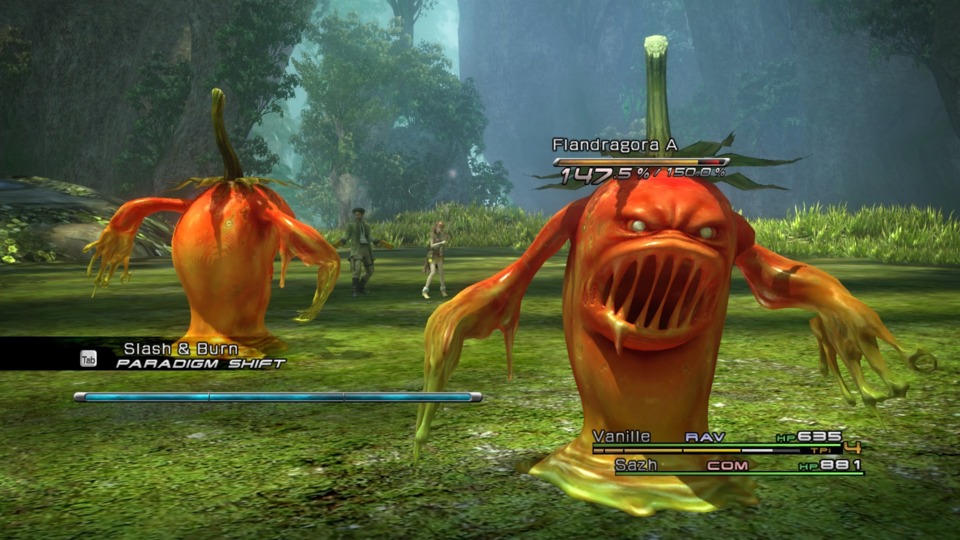
On paper, the environment is a repeat of the level design from chapter one. Sazh and Vanille move from one point to next and encounter several trash mobs during their journey. There's one significant difference between this level and the ones preceding it: there is an attempt at gameplay and visual variety. I'm not just talking about the weather changing puzzle, though it is a nice change of pace. The different sections of the Sunleth Waterscape feel distinct from one another. It starts as a wooded tropical-forest and transitions into a desolate mountain range. Enemy encounters also change as you move from one section to the next.
If the Sunleth Waterscape wasn't in service of the characters, then its art design would only do so much. Oddly enough, it is one of the few levels that allows the characters to breathe. Sazh and Vanille interact with one another, and their conversations feel neither forced nor arbitrary. Both characters play off each other and seem honest in their interactions. By the end of the chapter, I felt like I understood Sazh and Vanille. This result is the antithesis of Lightning and Hope's interplay during their adventures in the Gapra Whitewood.
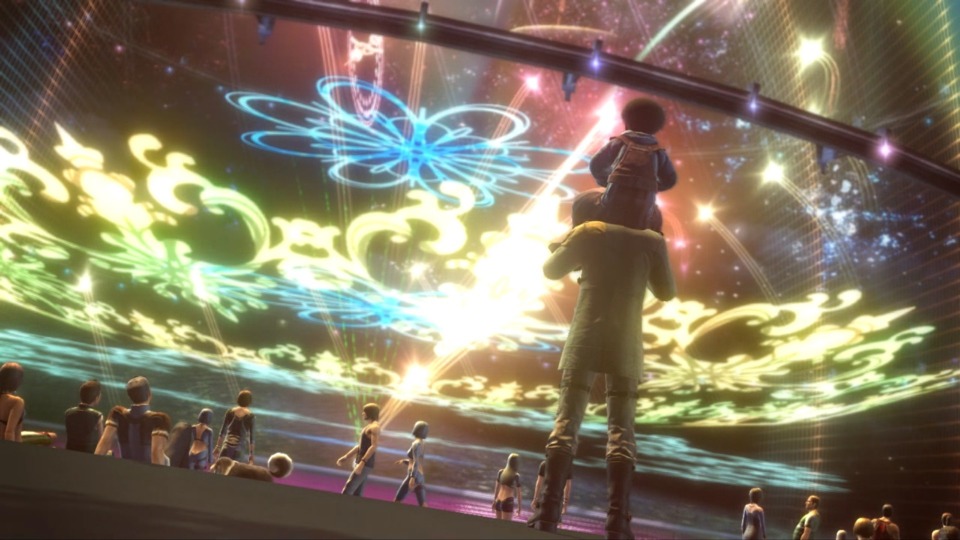
Admittedly, it's a story that relies too heavily on "destiny," but it works nonetheless. After murdering a dozen monsters, Vanille asks Sazh to tell more about himself. Sazh shares he has a son and the game juxtaposes to the fireworks show at Bodhum we have seen countless times. I've given the flashbacks in Final Fantasy XIII a lot of flack, but this time I have no complaints. This scene places a face on the crux of Sazh's character arc. Dajh is not a one-off we'll never see again.
Sazh divulges his son, Dajh, is a Sanctum l'Cie. During a cutscene, we watch a hooded Vanille brand Dajh. Once the scene is over, we learn more about why Sazh boarded the train with Lightning. He originally thought killing a Pulse fal'Cie would fulfill Dajh's focus. As Sazh tells his story, it is clear Vanille is struggling to maintain her composure. At the chapter's conclusion, you emphasize with Vanille. Do I wish the episode didn't culminate in a heavy-handed "crying in the rain to hide one's tears" scene?Sure, but the emotions conveyed are so raw I can forgive the game.
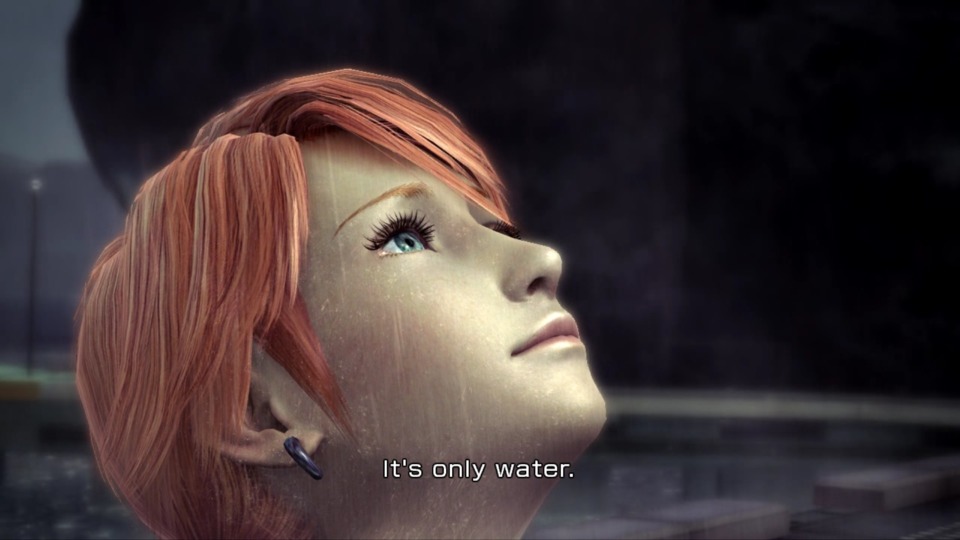
Part 23: Lightning Isn't As Bad As The Internet Says, But She Isn't Great
Let's transition from glowing admiration to scathing criticism. During the first episode, I stated Lightning recovers as a character. Chapter seven is the beginning of that recovery, but HOT DAMN is it rough. The first hour of chapter seven almost turns Lightning into damaged goods. In the chapter's introduction, Lightning acts like an aberration. It's odd to look at Sazh and Vanille and compare them to Lightning. Unlike Vanille, Lightning is a character painted with broad brush strokes and unearned moments of redemption.
The story's unwillingness to allow Lightning to stand independently is a bizarre misstep. Lightning doesn't receive an episode of her own, and that's partly why I never felt invested in her character evolution. Take chapter seven as an example. It starts with an introduction of a named commanding officer in PSICOM. The game does nothing with this character, but the first ten minutes serve as his introduction. Then, Lightning is consistently tied to Hope's slow and painful maturation. Just as she gets room to develop, the game drops an ill-fated Hope and Snow sequence that bludgeons you over the head with its simplicity. Time and time again, Lightning plays second-fiddle to characters that should be beneath her.
The game tries to foment interest in Lightning by having her connect the dots to a grand conspiracy. All the same, the game cannot make good on this plot development. After sleuthing past several PSICOM officers, Lightning and Hope stand in front of Carbuncle. Hope states Carbuncle provides food for all humanity, and this information leads to Lightning's epiphany. Lightning realizes fal'Cie use humans as pawns, and she plans to do something about it. This revelation comes from nowhere, and at no point have we seen Lightning conduct an investigation.
What's disappointing is this story arc has potential. In a future scene, an angry mob chases after Snow and Hope. The mob is fully propagandized by Sanctum. They blindly believe Pulse l'Cie are hard and fast societal evils. This scene would have worked better had Lightning been on the receiving end of the mob. We know Lightning regrets her military service. We also know she wants to make amends with her past. Bringing both to the forefront would have been a refreshing continuity break.
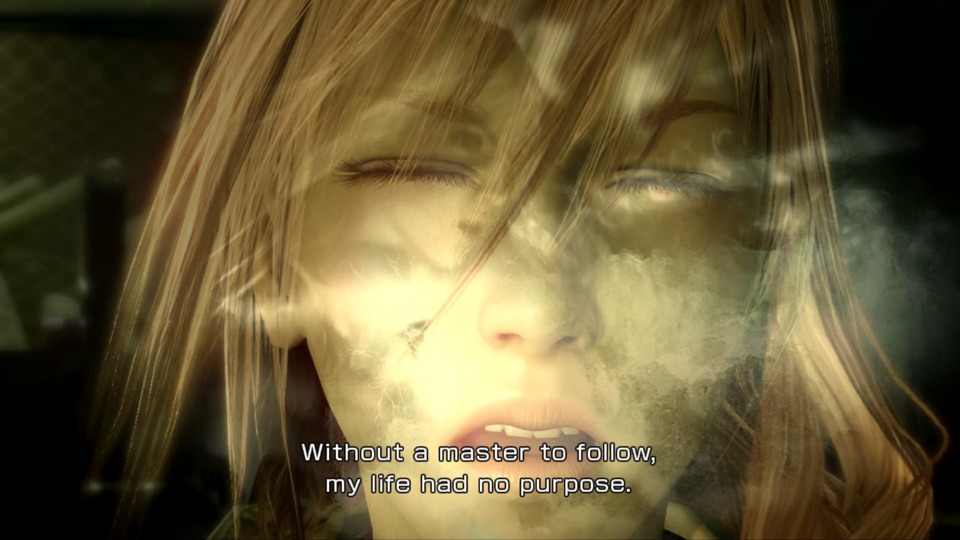
I want to clarify I'm not someone who should brag about their writing skills. I'm at best, an amateur blogger with eccentric tastes. I try not to back-seat write when playing games, but when so little is accomplished with a character like Lightning, I cannot help it. Everything attempted with Lightning feels "cheap." There's a cinematic where Snow rescues Lightning from an army of soldiers. The next scene shows Lightning assuring Snow she knows how to save Serah. It appears the two now have a workable relationship, but when the fuck did that happen? Character transformations rarely feel warranted, and Lightning is an unfortunate example.
I think Lightning's treatment of Hope is grossly negligent. The chapter begins with Hope enthusiastically leading Lightning through the sewers of his hometown. Hope uses this as an opportunity to reciprocate Lightning's guidance from the previous chapters. When Lightning has her epiphany, her first reaction is to kick Hope to the curb. Then there's the scene where Snow snatches Hope and whisks him away to safety. Lightning knows Hope wants to murder Snow. On top of that, when Lightning has an opportunity to talk to Snow, she only blabs about Serah. She waits until her second phone conversation to warn Snow about Hope. When this is unsuccessful, she tags along with Fang as if there's nothing to worry about.
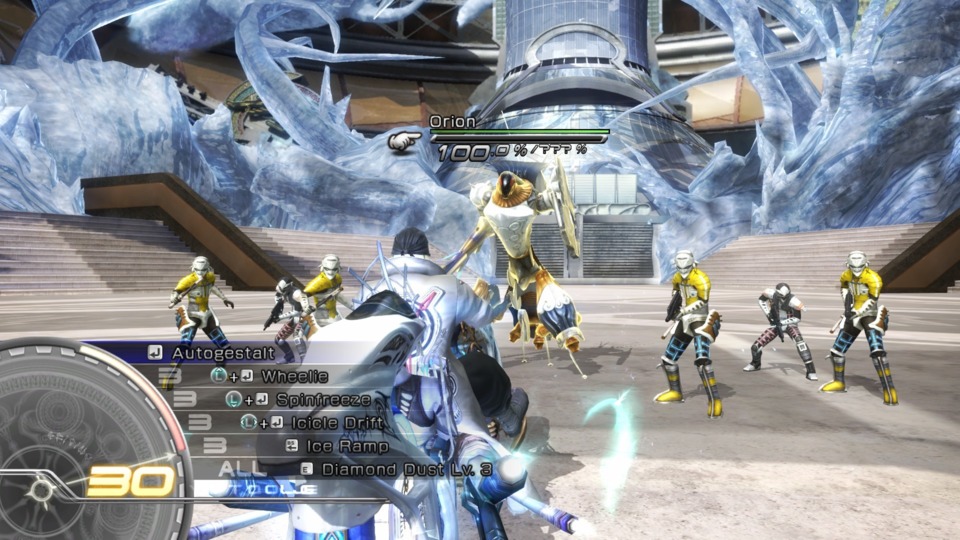
Part 24: Hope And Snow's Scenes Sucked Away My Lifeforce
It's finally here! We have reached the blow-off between Hope and Snow. God, this story arc is awful. It's so bad. I knew it would be a low mark in the game, but I did not anticipate every line of dialogue being horrible. Hope's hot takes are meant to foreshadow his confrontation with Snow. They instead make him look like a vulture waiting to pounce on a starving animal. Snow is almost as bad as Hope. He wantonly transitions between enthusiastic glee and anguished pain in the same scene.
It's important to note the Eidolons are essentially Transformers. If needed, Eidolons can change into vehicles that can travel massive distances. They also create a major plot hole. As an illustration, Snow rescues Hope using the motorcycle transformation of Shiva. He flies away with Hope in tow, and never uses Shiva for the remainder of the chapter. Additionally, Lightning's Eidolon can become a flying horse. This bellyaching might sound like a minor issue, but half of chapter seven is Snow and Hope getting lost and needing to be rescued! Why do they run around in circles for an hour when Snow has a magical motorcycle at his disposal?

Let's talk about Hope and Snow. Snow, being the miserable meatball he is, attempts to make small talk with Hope. Thankfully, Hope rebukes Snow and demands answers on what's happening. Snow explains he's fighting alongside Sanctum's "Calvary." The game then plops you into a battle. That's all the world building you get for a solid three hours. It's worth mentioning chapter seven is a tutorial level for the Sentinel class. When you control Snow and Hope, the game forces you to utilize Snow as a Sentinel. Playing Snow as a tank, and waiting for Hope to kill enemies, isn't fun. It fucking sucks. Every battle takes FOREVER because your only offensive character is forced into a supporting role.
Then there's everything the story attempts with Snow and Hope. Their character dynamic lacks any form of nuance. Each of their interactions copies and pastes the same structure. Snow rambles about Serah and Hope asks Snow how he handles failure. None of these interactions work. You can't sympathize with Snow because he's condescending. Throughout chapter seven, Snow continually views Hope as a liability more than an asset. He acts surprised Hope is alive, and actively ignores Hope's actions in combat.
Hope isn't any better. As you progress through Palumpolum, his dialogue is atrocious. The story desperately wants you to believe Hope is in the right, but it's done none of the legwork to justify his angst. One flashback five chapters ago isn't enough. Moreover, Hope's characterization is brazen. At one point, Hope asks Snow "What happens when your actions end up ruining someone's life?" I refuse to believe a grown adult wrote the dialogue.
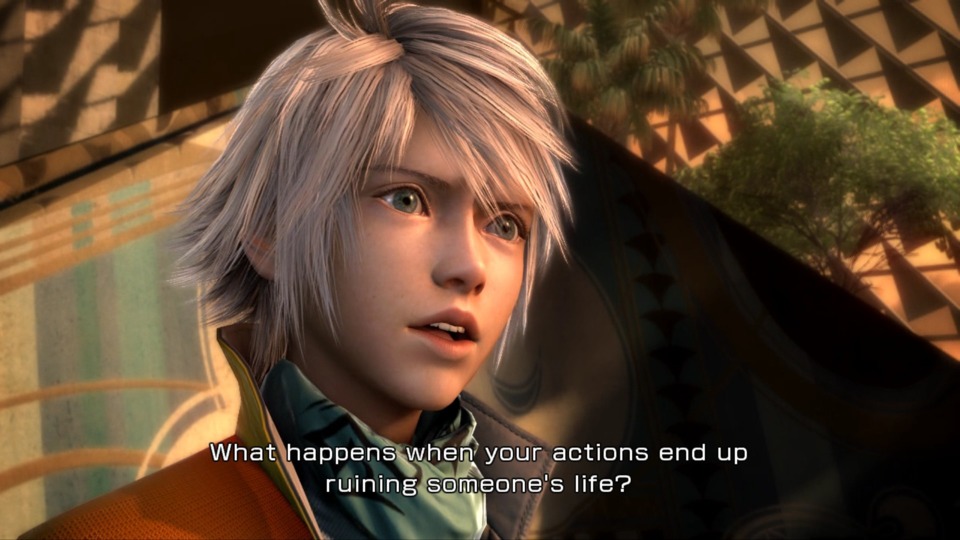
A conveniently timed explosion flings Snow over a ledge. Hope leaves him hanging, and after a bit of interplay, Snow has an epiphany. He realizes who Hope is and announces "you're the one!" Does anyone want to challenge my notion this game's script is an abomination? A second explosion pushes Hope over the ledge, and Snow sacrifices his body to protect Hope. When the game returns to the two, they squash their beef in ONE SCENE! Snow apologizes for the death of Hope's mother, and Hope admits he used Snow as a scapegoat. With that, the two are buddies for the remainder of the game! At one point we even see the two high-five each other before jumping into a war zone.
Good God, what happened to Final Fantasy? Square-Enix knows how to write good characters. It's not a secret recipe that died with some Polish cafeteria lady. They know how to write compelling characters! I don't understand how they could allow Snow and Hope to be this bad. There were two scenes where Snow thought about Hope's Mother. Both of those scenes occur in chapter one. And who writes Hope's lines of dialogue with a straight face? Is he an angsty teenager? Is he a broken trauma victim? Is he a figure of empowerment? WHAT IS THIS GAME TRYING TO ACCOMPLISH?
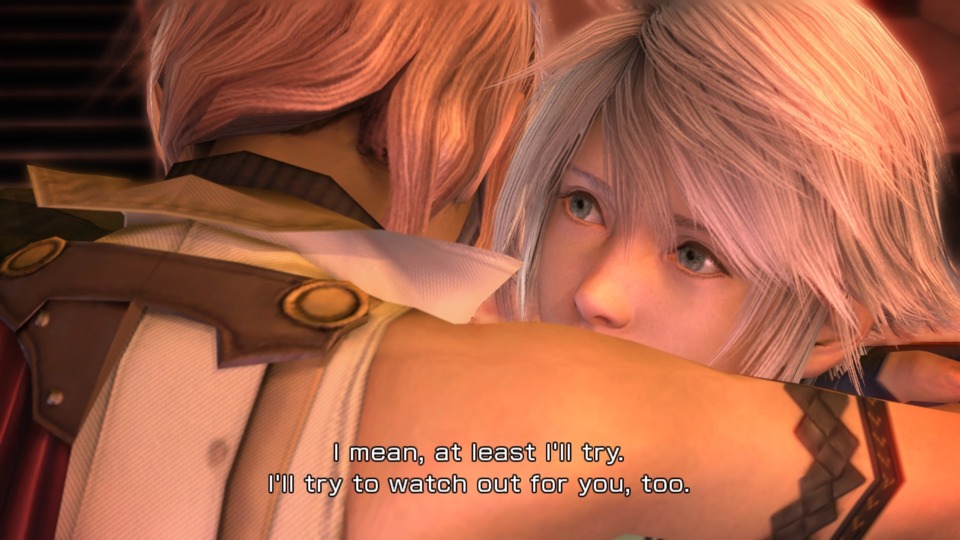
Part 25: Fang Deserves A Better Game!
I cannot emphasize enough, it's chapter seven and the game is teaching new mechanics. Chapter seven exists to teach the Sentinel class. That's why you are stuck using Hope and Snow for hours upon end. To add insult to injury, it's hour fifteen and the gameplay STILL hasn't opened up! We are more than halfway done with the game, and it continues to limit you to two characters. It's fucking ridiculous!
The pairing of Lightning and Fang works exponentially better than Hope and Snow. Lightning and Fang are great compliments in and out of combat. They play off each other in scenes that add much-needed levity. Lightning and Fang are not vessels for a story arc hardly suitable for a daytime soap opera. It helps their gameplay sections don't slow down to a crawl. Mercifully, Fang can hold her own in a fight.

Fang's spontaneity is a breath of fresh air. Unlike Lightning, Fang is emotionally transparent. She shares everything she knows about her past and leaves no stone unturned. Fang's brief monologue does a good job connecting recent events to the overall narrative. We discover Vanille and Fang were the force that rocked the Euride Gorge facility. As Fang divulges this information, she chides Lightning for not reacting. When things boil over and Lightning punches Fang, Fang goads Lightning into continuing. I enjoyed this moment because it establishes each character's perspective.
The game makes a nuanced point in pairing Fang and Lightning. Lightning is running away from her past, and Fang is the opposite. I found their interplay fascinating, but baffling. The story doesn't commit to either character, and much of their ethos is left undeveloped. For instance, when Lightning finds out Fang is partially responsible for Serah's branding, she punches her. Fang uses this as an opportunity to call Lightning a hypocrite. Unfortunately, the game never revisits these points. The game doesn't treat us to a Fang redemption arc, nor do we learn more about Lightning's service in the military. These compelling character interactions end up feeling like an anachronism.
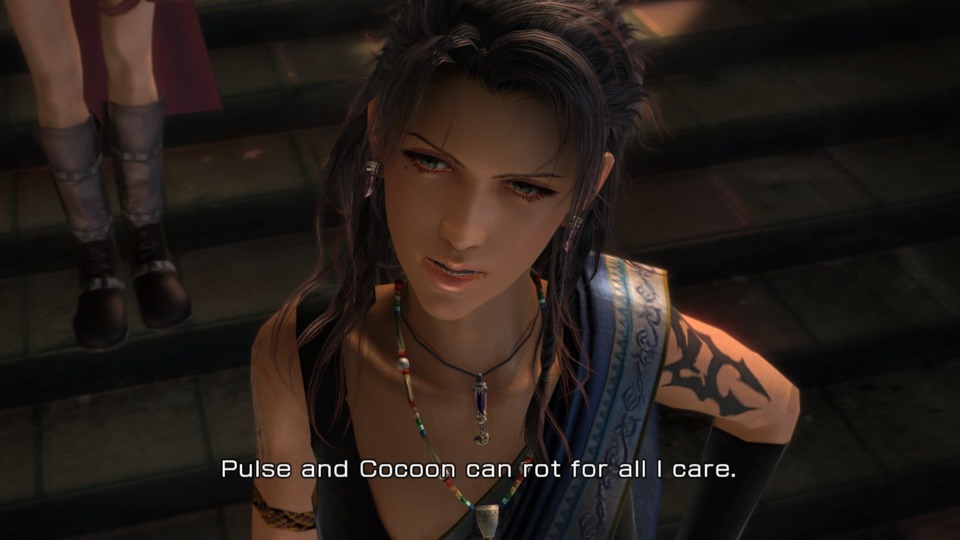
Just as Fang and Lightning get interesting, the game transitions to a plot beat about Hope's relationship with his father. This game spends an entire level on Hope talking to his dad. Luckily for Lightning, she has more scenes where she develops as a character. Fang, on the other hand, gets the short end of the stick. Unlike the other cast members, Fang doesn't have a carefully crafted level outside of her Eidolon battle. While Gran Pulse adds context to her past, that level is all about Vanille.
Before we move on, I want to briefly talk about Lightning's moment with Snow in the apartment. Moments like those are why I do not understand the vitriol directed at Lightning. She realizes her "go it alone" mentality is unsustainable sooner than most Final Fantasy protagonists. She doesn't wait until the end of the game to change her worldview like Cloud or Squall. Do you want to know what else I appreciate about Lightning? When she realizes she's acted foolishly, she apologizes to everyone who has suffered as a result of her actions. She even permanently changes her behavior. When the party reconvenes, she acts as the group's unbiased moral compass. What more can you ask of a modern Square-Enix protagonist?
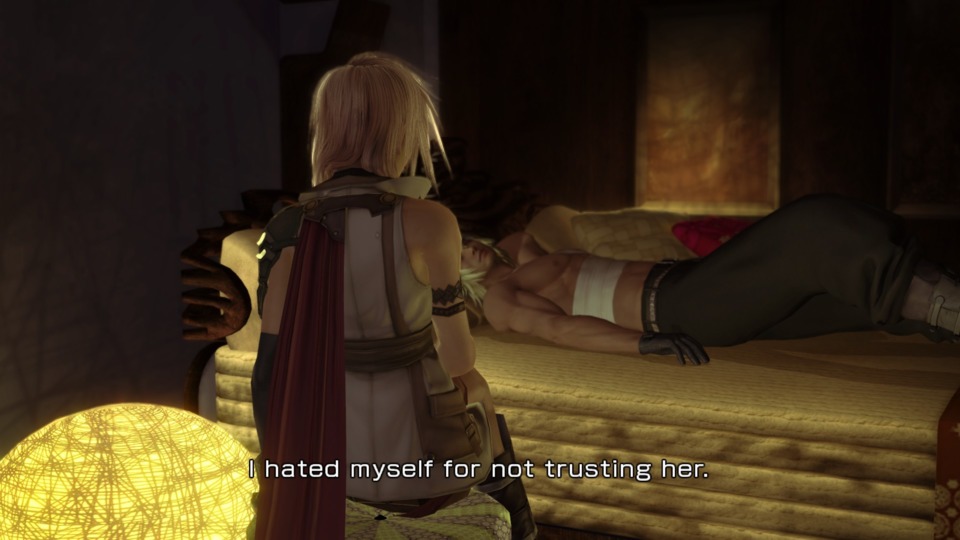
Part 26: Now We're Faffing About In An Apartment
I want to make something clear before we continue. Outside of Nautilus Park, Final Fantasy XIII takes a turn for the worse and never recovers. Every level is the same. Characters cease to evolve until the game's final act. The story becomes an incoherent nightmare. The game becomes a shitshow from this point forward. When I stop and think about it, the nicest thing I can say is the gameplay slowly opens up, but that's faint praise.
It's worth noting the story has plenty of dragons to slay. Will it revisit Lightning's relationship with her sister? Will we learn more about Fang's past? Will Snow delineate why he fell in love with Serah? The game answers each of these questions with a loud raspberry. I'm going to be brutally honest, I don't give a FUCK about Hope and his father! It's a relationship that starts and ends in chapter seven. It does not shed new light on our understanding of the world, nor does it help further Hope as a character. Hope tell his father he loves him, and his father reciprocates his feelings.
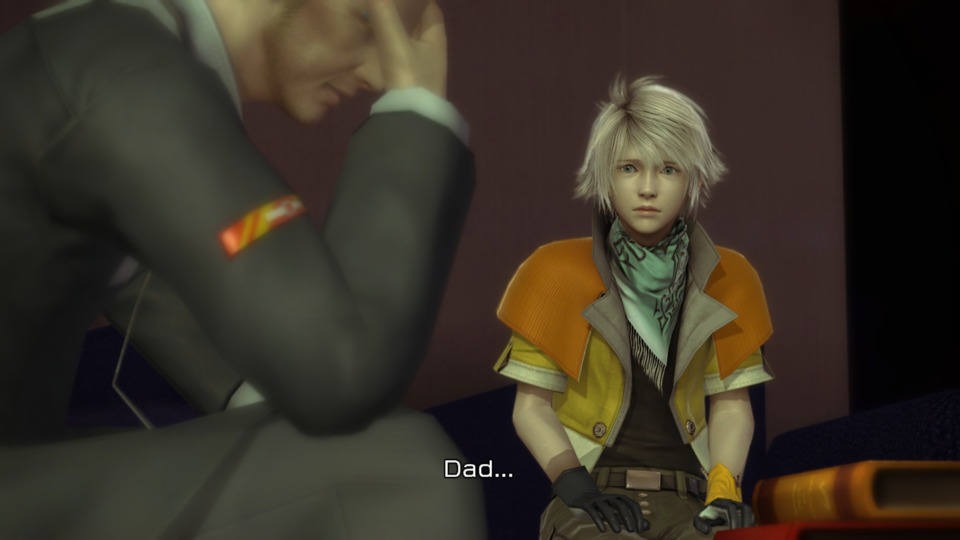
Can one of you tell me why Hope gets more scenes than any other character besides Vanille? Why are there more levels devoted to Hope than Lightning or Fang? Why is this moment all about Hope? We have seen these characters go through some shit. They all deserve an opportunity to breathe. Where's the opportunity for Lightning to level with Snow? Where's Fang's chance to learn about life on Cocoon?
Nothing is genuinely accomplished in the scenes involving Hope's father. Hope's father affirms his trust in his son and provides advice on what the characters should do next. That second point sounds more consequential than it is in execution. He warns the party cannot bring down Sanctum without consequences and cautions about the public's tendency to riot. Both are points we already know. After a confusing shootout, the game tosses in a bullshit boss battle.
The Havoc Skytank is another reminder of the game's limited artificial intelligence. Your inability to control your supporting characters slows this battle to a crawl. Worse, we're dealing with a gimmick boss battle. The Havoc Skytank has several parts, each with a different elemental immunity. It's highly recommended you focus on the components first. Otherwise, you'll take heavy damage and inflict negligible blows.
The Havoc Skytank highlights several issues I have with Final Fantasy XIII's gameplay. First, the computer doesn't know how to diversify its attacks. When you zero in on an enemy, the supporting characters only attack the same target. The second issue is something I have ranted about before. The game poorly manages your medics. On several occasions, I had two characters at low health. Computer-controlled medics would heal one to max health and allow the other to die.
I'm dancing around a more fundamental problem with the gameplay. Final Fantasy XIII feels like a Football Manager game. You stare at health bars and status icons more than the action on the screen. It feels less like a game, and more like a simulation. I reapplied buffs when I saw their icons blinking. I used healing spells when a character's health meter glowed. I switched my paradigms when an enemy's stagger meter decreased. The game repeats the same routine from chapter one with little variance. You rarely watch battles as they evolve and feel like a catalyst for a flowchart.
Part 27: Nautilus Park Is The Best Part Of The Game
Our time at Nautilus Park represents the game's high-water mark. The scene isn't without its share of issues. Exploring your surroundings is an unfulfilling affair. The NPCs pantomime like soulless zombies. Unlike the Golden Saucer from Final Fantasy VII, Nautilus Park feels empty. Say what you will about the minigames at the Golden Saucer, but they lent life to the world. For better or worse, Nautilus Park is a series of disconnected vignettes.
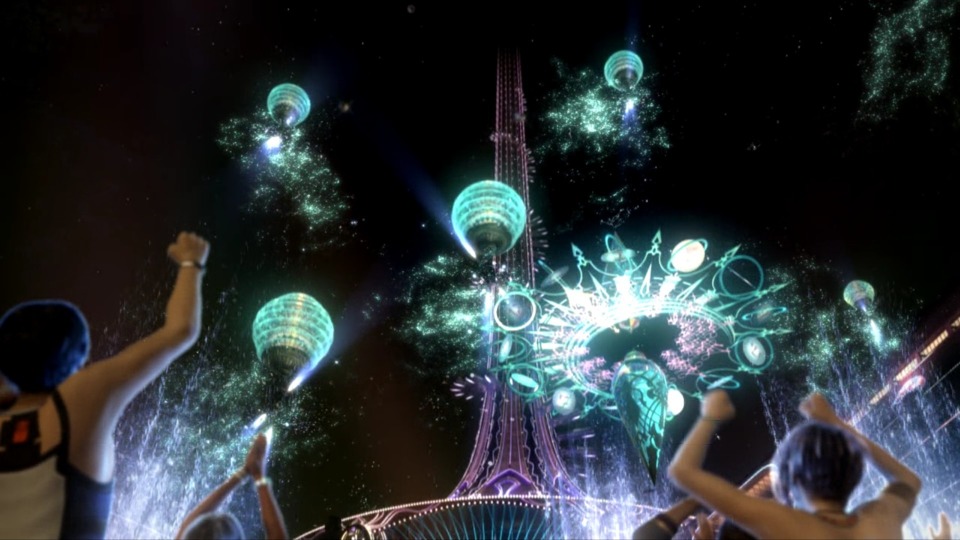
In the end, Nautilus Park doesn't feel like a waste of your time. There's some grounding in the world, and it's a beautiful level. Sazh and Vanille continue to play off each other, and their interactions feel natural. Furthermore, when the story takes its predictable turn to melodrama, you want to see what's going to happen next. There's even a sense of tension. Full disclosure, I thought Sazh was dead. The scene made me believe he was a goner, and that's a testament to how convincing the storytelling is during the chapter.
The level starts innocently enough. When Sazh and Vanille realize they have an opportunity to relax, they take it. If there's one quibble I have, it's the lack of a clear end-goal. We eventually discover Sazh plans to turn himself into the authorities. Until that point, we don't know why the characters want to be at Nautilus Park. I would also object to Sazh and Vanille "needing a break." Sazh and Vanille fought through one forest, but nothing felt especially troubling.
Eventually, the characters witness a fireworks display. The display showcases several holograms of Cocoon's thousand-year-old war against Pulse. That's the kind of world-building I have begged Final Fantasy XIII to use during its transitional scenes. We learn more about Cocoon's history in this scene than any of the previous chapters! Sazh makes the case displays like these are a regular occurrence. Hence, why the general public is in line with its government.
Vanille's relationship with Sazh is executed perfectly. There's depth to their relationship because it's not founded upon romance. Vanille desperately wants to tell Sazh the truth, and as the story unfolds, you watch her anxiety consume her. Yes, the Chocobo hide-and-go-seek minigame sucks, but that's irrelevant. Every scene between Sazh and Vanille frames the end of the chapter as a tragedy. Sazh feels comfortable sharing his story with Vanille, and that gets me every time. He tells her everything, and she rewards him with lies.
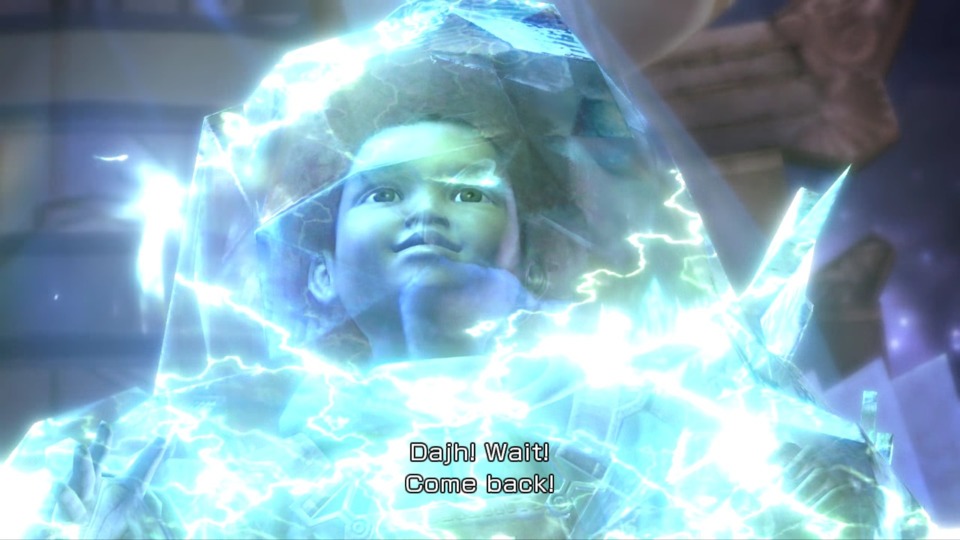
The look of betrayal on Sazh's face is a heartbreaking technical achievement. I enjoy how the story doesn't force a black and white sense of morality down your throat. Sazh's anger feels warranted, but Vanille isn't a villain. It's a rare example of Final Fantasy XIII's melodrama creating a human experience. It even leads to one of the few warranted Eidolon battles! It's one of the few times when Final Fantasy XIII manages to meld its gameplay and story. Finally, nothing in the story reaches the emotional heights of watching Vanille weep as Sazh points a gun to his head.
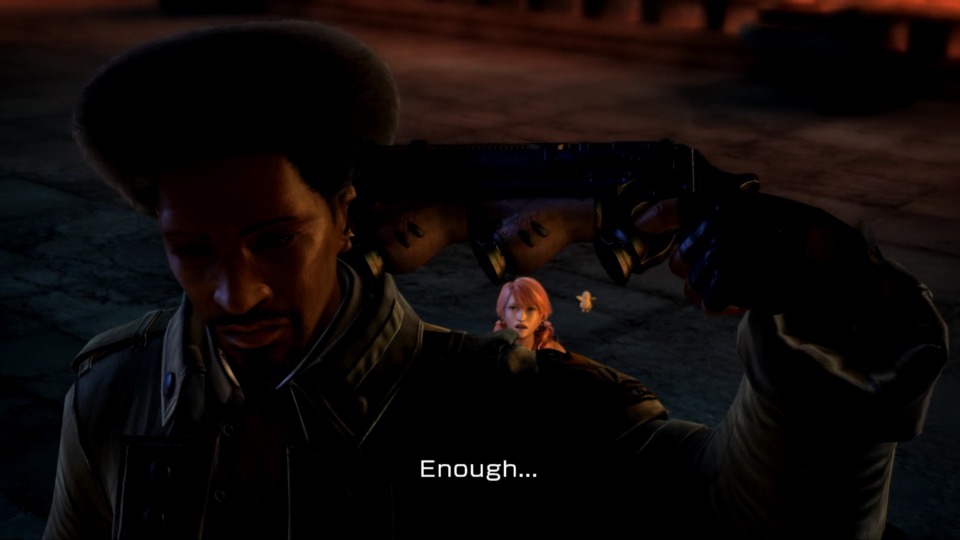
Part 28: The Palamecia Level Is DOGSHIT!
You would expect a Final Fantasy game to continue the gravitas of a prior scene, but we're talking about Final Fantasy XIII. Sazh and Vanille are carted away, and the game jump cuts to Lightning on the Lindblum. After learning of Sazh and Vanille's pending executions, the team drops all pretense and plans a direct invasion of Sanctum's capital ship. The game tries to make characters out of Cid Raines and Rygdea, but it fails spectacularly. Most notably, Lightning's planning session ends with a collective declaration about the power of teamwork. I wish I were kidding.
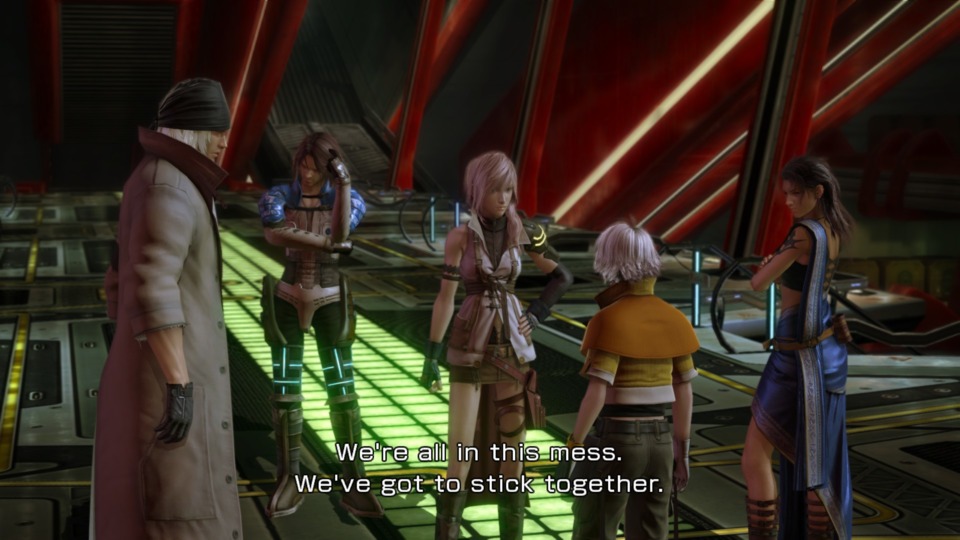
Never before have I seen a game accomplish so little out of a level. Yes, this is when Galenth Dysley reveals his master plan. Yes, there's a touching moment between Vanille and Sazh. Yes, the characters come together in a neat package. Be that as it may, navigating the Palamecia is a fucking nightmare. It's a monotonous slog that lasts far longer than it should. More than half the level involves snaking around scaffolding and fighting trash mobs. The distance covered is short but every corner is crammed to the brim with enemy encounters. Worse, we battle the same goddamned robots and foot soldiers we have seen countless times already.
The level has a massive tone problem. In-between Lightning affirming her role as a leader, and Vanille detailing her past, there are odd interjections of comedy. This is the chapter where I felt the game could not make up its mind on Sazh. After letting the man pour his heart out, the story reverts him to comic relief duties. There's another gag where Jihl Nabaat struggles to manage the Palamecia's "security level," but this happens AFTER Vanille pleads with Sazh that she didn't mean to hurt his son. Finally, with Hope and Snow "done" as characters, their lines of dialogue are 90% witty one-liners, and it's the worst.
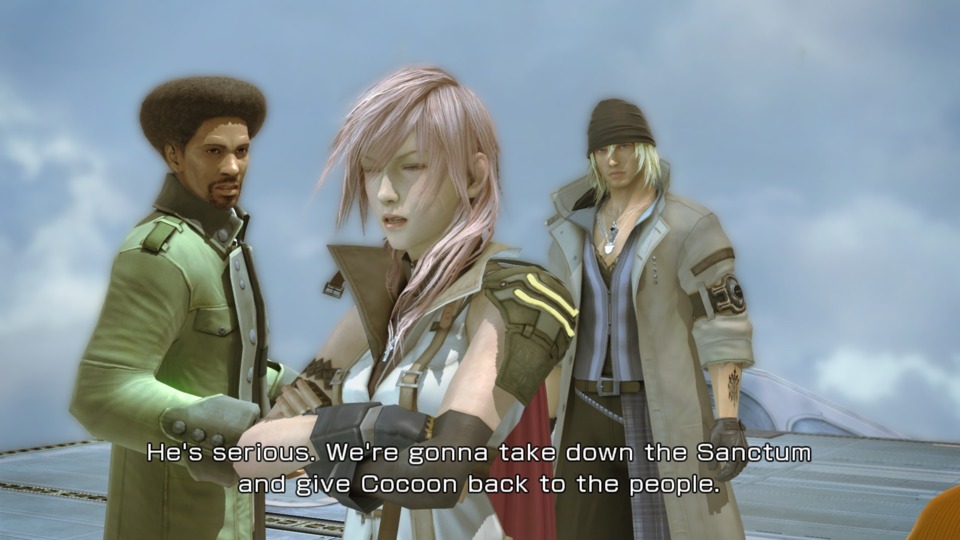
The story doesn't get better. "Generic" is the best word to describe Final Fantasy XIII's story. It's an exercise of rote storytelling dressed up in tailor-made clothes. Vanille needing to lie to Fang about her focus is interesting. The problem is the game doesn't build upon this premise until the penultimate chapter. Instead, we listen to Space Pope screech about how he's been manipulating the characters.
PSICOM spends too much of the game lacking a figurehead. Yaag Rosch speaks two sentences and isn't seen for hours. However, the game demands you care about generic soldiers and generals. When the game offs Jihl Nabaat, it expects a horrified reaction from the audience. The same sentiment applies to Galenth Dysley. Before chapter nine, Dysley is seen in two cinematics. Nothing in the story feels in service of framing Dysley as the ultimate villain. Instead, he unceremoniously spills the beans about wanting to bring the apocalypse.
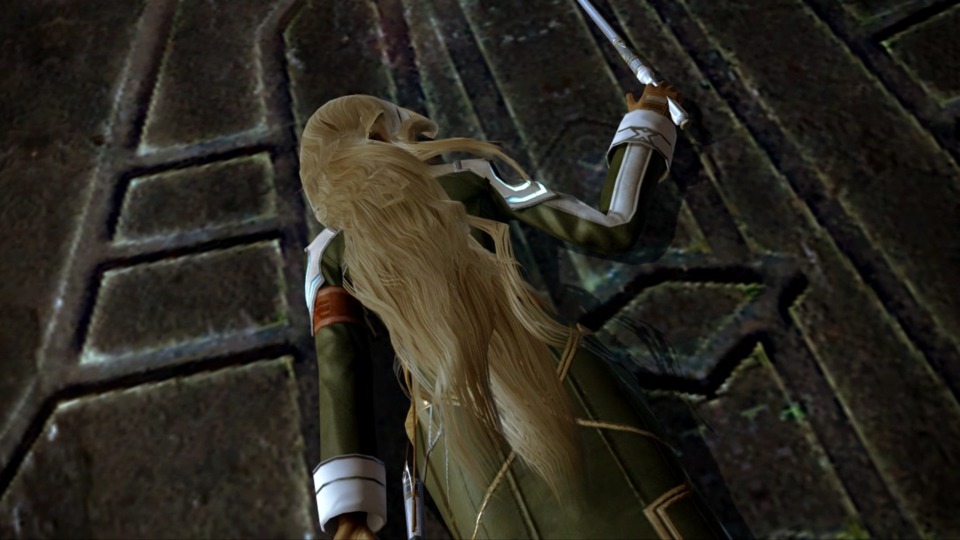
It took me twenty-five hours to get to the first Barthandelus battle. Around this point, I had an epiphany. I don't understand why we need to fight Barthandelus. I don't understand why we need to go to Gran Pulse. I don't understand how fighting Dysley fulfills our focus. I don't understand basic concepts guiding these characters from one point to the next. Think back to your favorite Final Fantasy game. By this point, Kefka was already a factor. Cloud came to terms with his past. Edea wasn't the main villain. Zidane and Kuja were debating their humanity. What the fuck is happening in this game? Did I forget to play a Nokia flip phone companion app? Was there an anime adaptation I forgot to watch?
Part 29: I Give Up! FUCK THIS GAME!
Dysley reveals his master plan after a bit of hemming and hawing. From what I understand, and correct me if I am wrong, a god conceived Gran Pulse and Cocoon. This god created humans and fal'Cie, and is referred to as "the Maker." The fal'Cie can use humans as a blood sacrifice to summon this god of creation. Dysley brands our heroes in hopes of summoning Ragnarok. Ragnarok can perform a ritual that extinguishes all of humanity. This ritual will summon the Maker who will create a new world that Dysley believes will be better than Cocoon and Pulse. This story is stupid, and it is stupidly told.
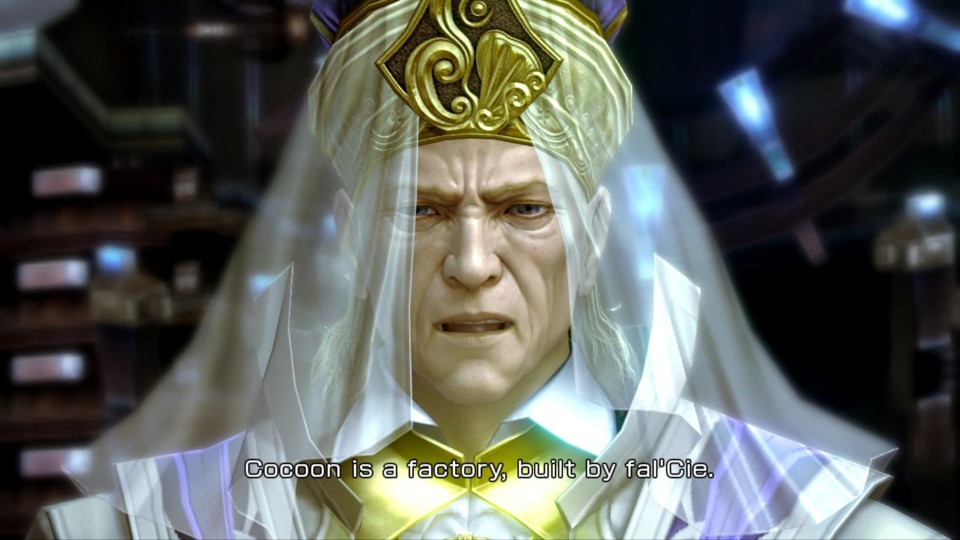
The Final Fantasy franchise has a long and storied history of relying on "destiny" as a storytelling stop-gap, but this is a bridge too far. Dysley explains in excruciating detail how he's manipulated the characters. "Contrived" is the best word to describe this plot twist. Dysley has an army of loyal lackeys, but he picks six seemingly random humans to service his master plan. He knew a fal'Cie vestige contained Fang and Vanille but didn't send his elite soldiers to awaken them. Furthermore, why does Dysley spill the beans about his scheme? Wouldn't it have been better to keep it a secret until the end?
Final Fantasy XIII's story boils down to the characters needing to stop the Apocalypse. Yes, the characters are guided by destiny, and woe is them, but why does this game take THIRTY HOURS to tell a story about an old man wanting to see the world burn? How does any of that relate to the character experiences from the previous chapters? How does Barthandelus help Hope confront his grief? How does Ragnarok build upon Snow's survivor's guilt?
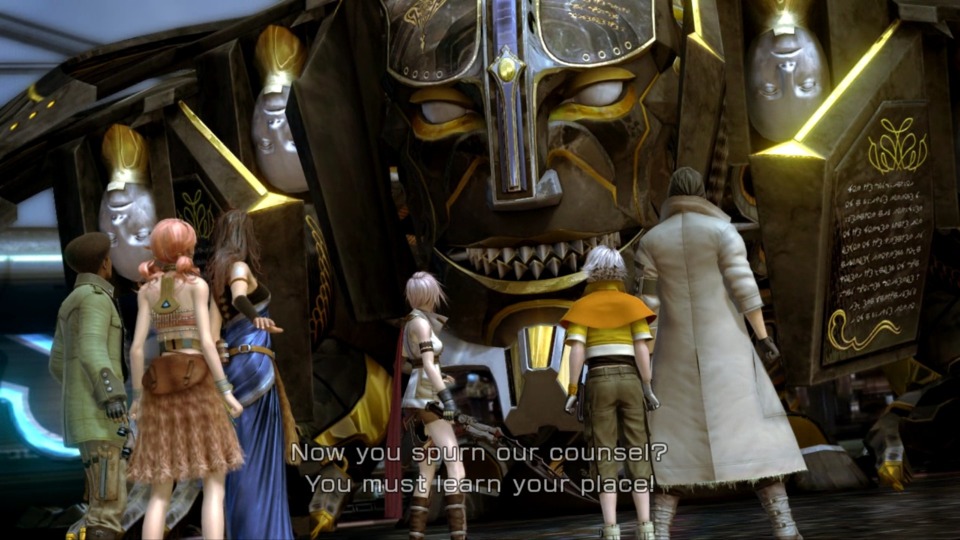
The first battle against Barthandelus is the worst thing Square-Enix has made in the past decade. It's cheap, ugly, and no fucking fun to play. I do not want to hear any of you say he's easier if you max out your Crystarium. Grinding sucks and there's no place to efficiently grind until Gran Pulse. Not to mention, I shouldn't have to grind to beat a boss placed halfway in the story. Finally, Barthandelus uses "Doom" on Lightning. That's fucked up when the game is over if the player character dies.
Barthandelus inverts several gameplay mechanics. Final Fantasy XIII's bosses usually value careful planning. This boss casts Doom by the twentieth minute and demands you enact high-risk maneuvers. Moreover, when two-thirds of the battle involves killing off adornments, adding a timed mechanic is bullshit. Then there's Barthandelus' "Destrudo" ability. Whoever thought it would be interesting to design an attack that ignores the player's tanks shouldn't be allowed to make video games.
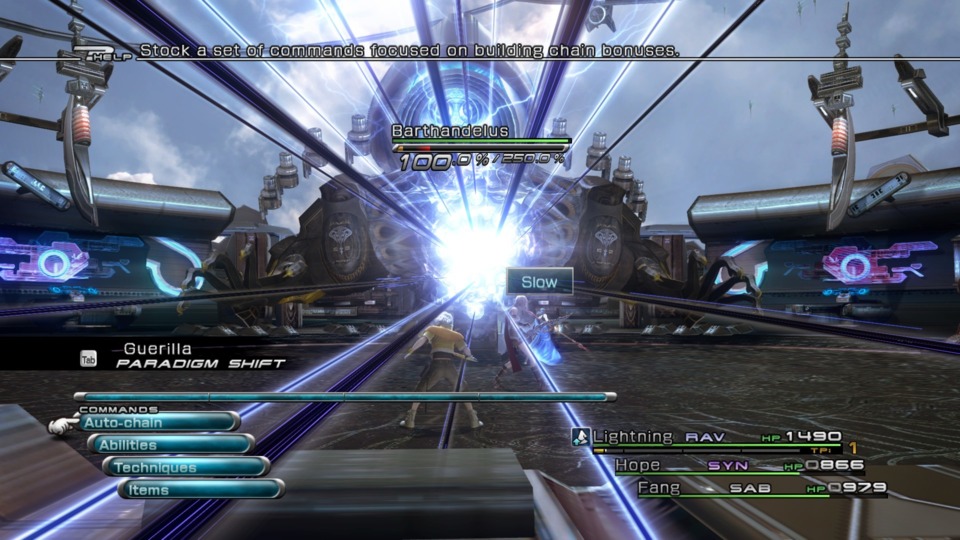
Part 30: Chapter Ten Is A Waste
Chapter ten repeats all of Final Fantasy XIII's worst habits. It copy-pastes the same corridors to no benefit to the characters. The story moments are spread hours apart, and what we learn isn't compelling. The chapter culminates with Cid attempting to kill the cast. Maybe I would give a fuck if Cid felt like a character with ambitions. Ultimately, he's an impediment you read more about in the codex.
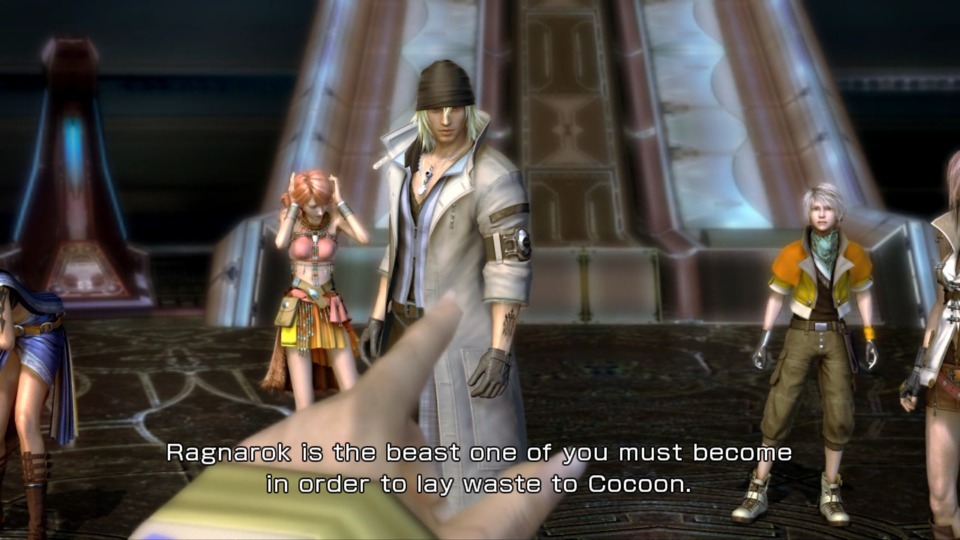
Cid reveals himself to be a l'Cie. He announces to our party he plans to stop Barthandelus by killing us. When he fails, he disappears into the ether. What I do not understand is why these characters do not talk out their problems. Cid and Lightning's goals are mutual. Why can't they work together? Moreover, it's hard to get choked up about Cid's defeat when he barely feels like a character.
I would be lying if I didn't admit the chapter starts decently. After Space Pope floats in the air and spews some villainous bullshit, Lightning's party ends up in a spacecraft. The airship pilots itself through a wormhole that leads to a training ground. Nevertheless, chapter ten wastes this perfectly good environment. The Fifth Ark is a beautiful robotic underworld, and the game does nothing with it. Outside of Barthandelus' loathsome speeches, the game doesn't feel especially invested in his scheme. Barthandelus doesn't chide Lightning as she progresses through the level. The chapter instead devolves into a vapid series of battles against trash mobs.
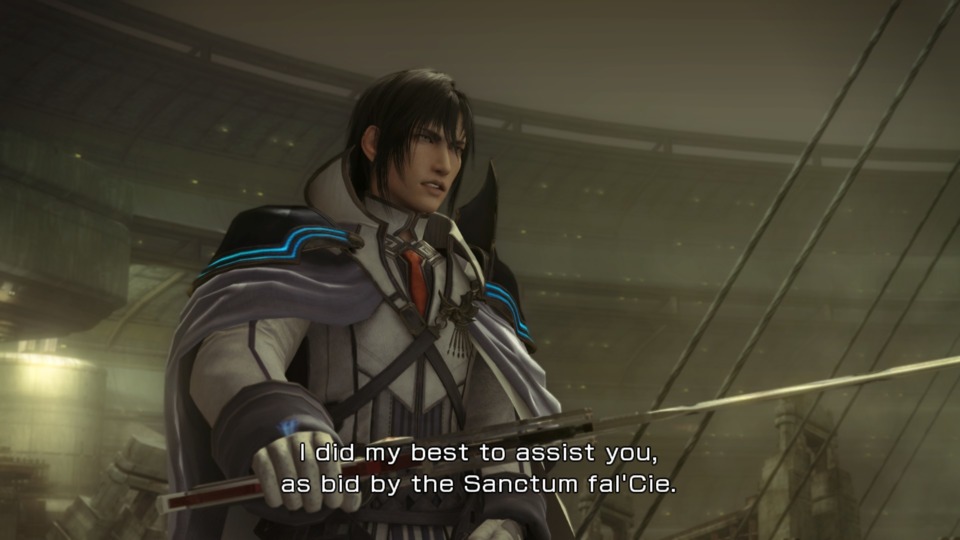
Fang's has the most unnatural Eidolon battle. After making some progress in the Fifth Ark, Fang decides enough is enough and she's going to leave the party. Why would she think such a thing? She's sick and tired of treating Cocoon as something worth saving. Again, there's an interesting premise here, but the game doesn't tap into it. The prospect of one of our party members not being fully invested in our mission has potential. Unfortunately, the issue isn't allowed to grow after her Eidolon battle.
I want to compliment the game's attempt to put Snow in doubt. However, Lightning shakes Snow from his lack of faith after one inspirational speech, and we never discover what caused Snow to doubt himself. The scene was arbitrarily constructed for the sake of it existing, but that applies to everything involving Snow. All this game is willing to do is expose surface level emotions and masquerade them as higher orders of thinking. Showing a character in a depressed state doesn't make a scene melancholic!
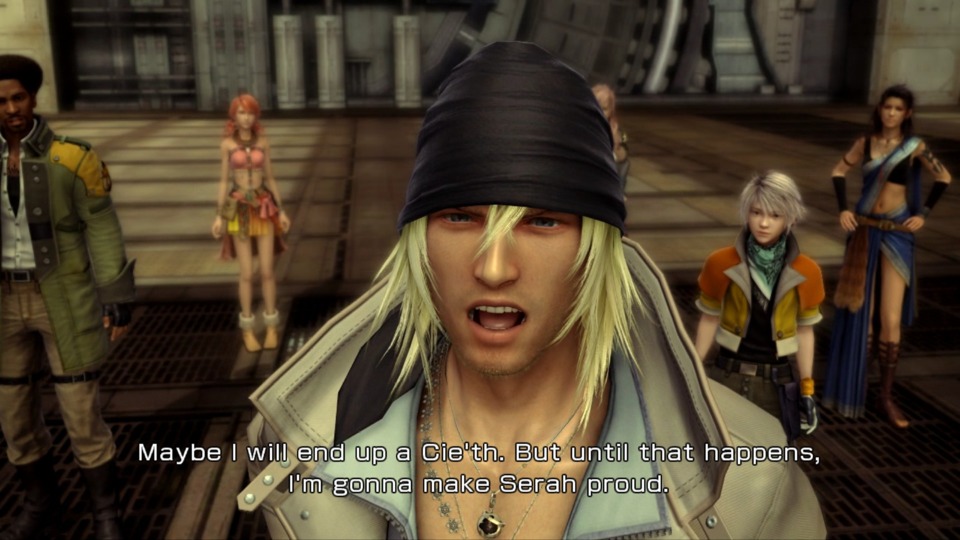
What causes this level to kludge up more than the previous ones is the lack of character interactions. The characters are not afforded a chance to absorb their surroundings. There are so many corridors that exist to pad out the game's length, and their monotony doesn't just cripple the level design. When I saw my first tyrant I was impressed by its artful construction. I was less impressed when the game repeated the same encounter twice. Eventually, the characters find a spaceship. None of the characters are able to make a convincing argument why they should go to Pulse, but they end up going regardless. I am told this news is a positive development. I don't believe it. This game is a brutal lie.
